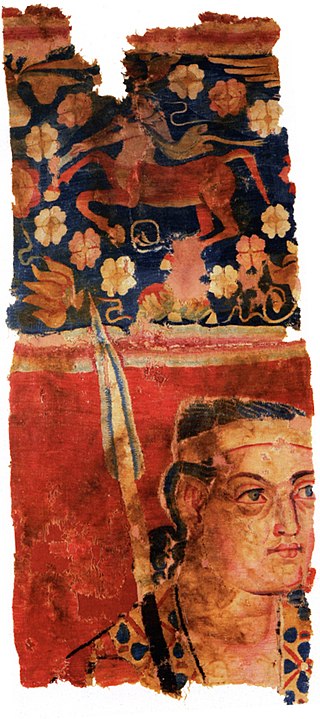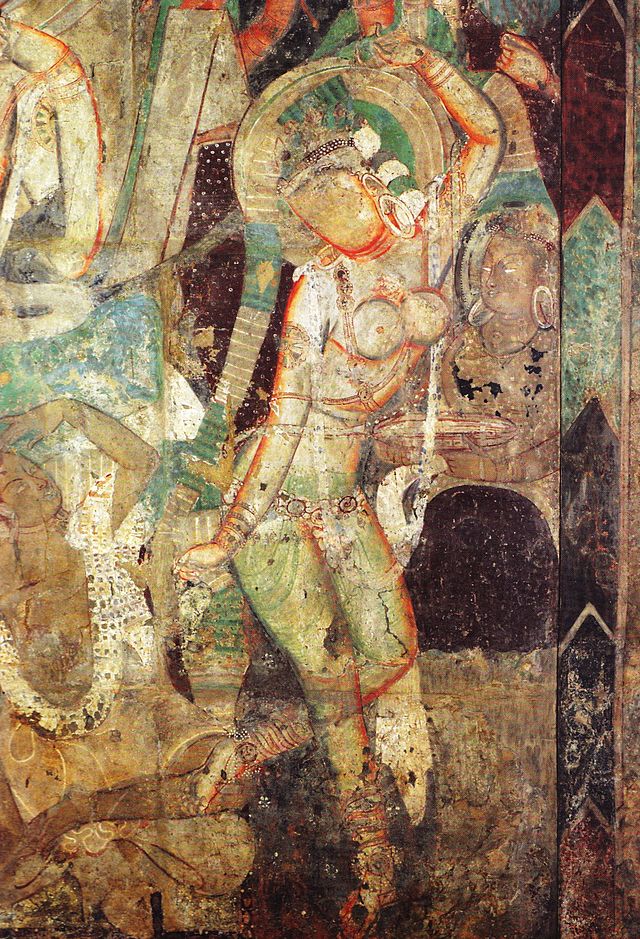 |
| The first of the Red Hair Tribute enthroned as Ancestor Spirits |
 |
| Depiction of Kastok |
The Red-Hair Tribe
What the histories
tell us
1503 Pentans
returned to Oraya
1506 Nights of
Horror. The Redlands are abandoned to
the Lunars.
The Red Hair Tribute is instituted.
1560s First of
the Etyries Caravans across the steppe, guarded by Kastok’s lance
What we can know
from the histories and other sources
Lunarised in religion, otherwise culturally Pentan,
regarded as loyal by the Empire, mocked by the Pentans, feared by the Orayan
farmers.
Their Culture
A mish-mash of elements from each of the true Pentan
groupings, with a Lunar overlay. There
is nothing distinctive to them apart from their hair and a preference for red
lunar wool for their clothing.
Their Religious
Traditions
Path of Fire Tradition [Fire,
Horse]
Mythos and History
Kargzant is the One True Sun, and this was revealed in
the Darkness when he rode high whilst other contenders for the title were
obscured or diminished. He made the
Starlight Ancestors and is thereby lead stallion for both the Great Herd in the
sky, the Horse Herd in Glorantha, and the Human Herd, or Riders. He has discovered his true rôle as faithful
servant and steed to the Red Khan.
Nature of the Cult
The primary male Red Hair Tribe way of being.
Depiction
None needed. He is
the sun.
Particular Likes
and Dislikes
Favours the other spirits followed by the Red Hair Tribe
and the Lunar Empire. Distrusts all
others.
Cult Organization
and Holy Places
The cult is based around power, with shamans
acknowledging the status of their fellows, and each being the centre of a small
band of followers and apprentices.
The Holy Place is the Slave Block at the Red Hair Place,
where the Tribe was founded.
Holy Days
Clan dependent.
The Kargzant
Spirit Society (Sun, Horse)
The Spirits of the Society are not to be lightly used,
since they are of the Sky Herd closest to Kargzant himself. Leaders usually leave them untouched if other
powers may accomplish the task.
Red Steed Spirits (Horse) – These spirits can undertake
prodigious feats when facing enemies of the Lunar Empire. They are the sign of the true servant of the
Red Khan.
The taboo is Never Question A Lunar Order
Hawk Spirits (Sun) – These spirits are the spies of the
Khan, flying high and far to scout the lands.
The taboo is Untrusting
Solar Stallion Spirits (Horse) – These spirits can
strengthen a mount in every physical way, can defend it against magic, and can
enable it to leap to the horizon, run on a sunbeam, or to leap a wall.
The taboo is Always Care For Your Mount’s Needs Before
Your Own
Path of Fire
Tradition
To join the Tradition, you must first have a Fire Rune.
For game purposes, any hero with a Fire Rune can join the
Tradition at the same rating as their Fire Rune. Simply add Path of Fire
Tradition (Fire, Horse) keyword after the Fire Rune.
When joining the Tradition, you receive a number of
charms, as described in the HeroQuest core rules (page 112). Charms of the
Tradition are chosen from amongst the spirits of the clan’s Spirit Societies.
Blazing Suns –Path of Fire Shamans
After decades of experience, a worshipper with Tradition
rating of 11W or higher can become a Blazing Sun, a shaman of Kargzant.
The Seeker’s Test is a re-enactment of the bonding ritual
between the first Great Shaman of Kargzant and the Red Khan. If the Blazing Sun-to-be succeeds, then he
discovers his true Spirit Sun Stallion.
The Fetch
The Spirit Sun Stallion manifests as a fiery mount for
the Blazing Sun.
The Spirit Sun Stallion performs all the functions of a
fetch (cf. HeroQuest pg. 114)
Blazing Suns have access to the other spirit societies of
the Tradition.
Power Spirits (Fire) – These spirits may be released to
attack Darkness spirits or magics.
Spirits of
Reprisal
The apostate will appear fringed with black to any form
of spirit vision. Reprisal belongs to
the clan.
 |
| Mosaic of Foilen amidst fallen prey |
Tradition Spirits
Red
Hair Tribe Names
Imperial Sun Kargzant
Elder Bornad
Hunter Morgzil
Founder Red
Khan
Fire Stallion Tirgzant
Dog Dua
Owl Foilen
Speaker to Walkers Chandrant
Path of Earth Tradition [Earth,
Horse]
Mythos and History
Ma-Tamara is the Red Moon Mare who was revealed when the
Char-Un arrived in the West. She is more
powerful here than is the Earth Mare, and has taken on leadership of the
Herd. Her story is long and confusing,
with many hidden and powerful rites shared with Lunar cults. She is the heart and spirit of the Lunar
Empire, which we serve in penance for our ancestor’s sins.
Nature of the Cult
The primary female way of being amongst the Red Hair Tribe
Depiction
A majestic red mare, preferably made from Moon rock, but
usually from burnished copper.
Particular Likes
and Dislikes
Favours the other spirits followed by the Red Hair Tribe
and the Lunars, and despises all others.
Cult Organization
and Holy Places
The cult is rigidly hierarchical, with senior shamans
having absolute power over those beneath them.
They meet in annual conclave to decide on clan policies.
The Holy Places are anywhere housing Red Moon Rock.
Holy Days
Clan dependent.
The ma-Tamara
Spirit Society (Horse, Moon)
These spirits are the great and powerful herd mothers
since we came to the West.
Mare Spirits (Horse) – These spirits can enhance the
beauty and power – including fertility – of a mare. They can find good pasture and heal a wounded
horse.
The taboo is Defend The Herd
Moon Spirits (Moon) – These spirits can be used embody a
herd mother into the lead mare to bring otherworldly wisdom, or fresh hope in
the darkness.
The taboo is Never Light A Torch
Lunacy Spirits (Moon) – These spirits can inflict and
cure madness.
The taboo is Never Hide From Moonlight
Path of Earth
Tradition
To join the Tradition, you must first have an Horse Rune.
For game purposes, any hero with a Horse Rune can join
the Tradition at the same rating as their Horse Rune. Simply add Path of Earth
Tradition (Earth, Horse) keyword after the Horse Rune.
When joining the Tradition, you receive a number of
charms, as described in the HeroQuest core rules (page 112). Charms of the Path
of Earth Tradition are chosen from amongst the spirits of the Clan’s Spirit
Societies.
Horse Mothers –Path of Earth Shamans
After decades of experience, a worshipper with a
Tradition rating of 11W or higher can become an Horse Mother, a shaman of the
Path of Earth.
The Seeker’s Test is to accept the visitation of a Lunacy
Spirit. If the Horse-Wife-to-be
succeeds, then she discovers her Iriloy-Self.
The Fetch
The Iriloy-Self manifests as a horse-shaped shadow. She performs all the functions of a fetch
(cf. HeroQuest pg. 114)
Horse Mothers have access to all the spirits of the Path
of Earth and the following spirits.
Dead Horse Spirits (Death) – These spirits can guide a
horse’s spirit painlessly into the Plains Beyond Death, and can smell the
presence of a Horse-Killer.
Taboo is Never Let A Horse Suffer
Living Horse Spirits (Horse) – These spirits can
sniff-out fodder, fight horse-disease spirits, heal a horse’s wound, or be
released to act as a spirit-guardian to a new born foal for a week.
The taboo is My Mare Is My Sister
Spirit Horse Spirits (Spirit) – These enable control of
horse spirits and the riding of Spirit Horses.
They can leap to the surface of the Moon, and can ride on
Moon-beams.
The taboo is Don’t Look Down
 |
| Durla's war-dance |
Spirits of
Reprisal
The apostate will be thrown by any horse they try to
mount
Tradition Spirits
Red
Hair Tribe Names
First Wife ma-Tamara
Earth Mother Lorest
Spring Horse Arginu
Teacher Tarmenu
Crone Oijampek
Warrior Woman Durla
The Dawn & Dusk Tradition [Runes
of the Spirit Society the character wishes to join]
Nature of the Cult
A collection of various spirit cults bringing purpose and
life to those who cannot, or will not, follow the major paths.
Depiction
Varies with the Spirit Society & the clan.
Particular Likes
and Dislikes
Favours the other spirits followed by the Red Hair Tribe
and the Lunars, and despises all others
Cult Organization
and Holy Places
There is a distinct lack of organisation within the cult,
with local and wandering shamans leading rites when called upon, or at their
whim. Holy Places vary with Spirit
Society & clan.
Holy Days
Dependent upon the individual shaman.
Path of Dawn &
Dusk Tradition
To join the Tradition, you must first have a Rune
connected to one of the Spirit Societies.
For game purposes, any hero with a such a Rune can join
the Tradition at the same rating as that
Rune. Simply add Path of Dawn & Dusk Tradition (chosen Rune) keyword
after the Rune.
When joining the Tradition, you receive a number of
charms, as described in the HeroQuest core rules (page 112). Charms of the Dawn
& Dusk Tradition are chosen from those of the chosen Spirit Society.
Tatoo Dancers - Path of Dawn and Dusk Shamans
After decades of experience, a worshipper with a Path of
Dusk and Dawn Tradition rating of 11W or higher can become a Scar Dancer of the
Path of Dawn & Dusk.
The candidate must undergo a drastic tatooing, linking
all their previous tatoos together. If
they survive they will awaken their Fetch, the Dancing Tatoo.
The Fetch
The Dancing Tatoo performs all the functions of a fetch
(cf. HeroQuest pg. 114)
Tatoo Dancers have access to the following Special
Spirits –
Dead Steppe Spirits (Death) – These act to propitiate and
pacify your ancestors
The taboo is Obey Clan Chieftain
Survival Spirits (Light) – These light campfires, ward
the edges of the camp, and act as beacons to other clan members. The taboo is Never Put Out A Flame
Spirits of
Reprisal
The apostate’s tatoos will glow gently at night – only a
little, but enough to attract attention.
 |
| Tunal and Yunal |
Tradition Spirits
Red
Hair Tribe Names
Throat Singer Duyadoya
Body Marker Oigirkuru
Foresight & Death Talker Tunal & Yunal
Hammerer Badask
Red Hair Tribe Deities
Icebreaker Kalikos
Punisher of Pent Yara
Aranis
Underworld Gorgorma
Warrior Chaghatishi
Red Hair Tribe
Names
A good half of all names given within the Red Hair Tribe
are either ‘borrowed’ Pelorian names, or modified Imperial names and
titles. Within the other half three
quarters are of two syllables, the others being evenly divided between three, four and five.
The syllables themselves differ between the things being
named.
Male and ‘Other’ Initial Syllables
Oi-, Tun-, Yun-, Foi-, Bad-, Karg-, Kal-, Born-, Morg-,
Tirg-, Du-, Chand-, Chag-, Tak-
Male and ‘Other’ Middle Syllables
-ik-, -kur-, -gir-, -hat-, -ish-, -en-, -eg-
Male and ‘Other’ Terminal Syllables
-a, -i, -u, -al, -ask, -os, -zant, -ad, -zil, -len, -rant
Female Initial Syllables
Ta-, Lor-, Arg-, Oi-, Ya-, Gor-, Tar-, Dur-, Ar-, Hon-,
Sed-
Female Middle Syllables
-an-, -en-,-in-, -jamp-, -gor-, -ma-, -men-
Female Terminal Syllables
-la, -est, -u, -ek, -ra, -ma, -ya, -is, -eel
No comments:
Post a Comment